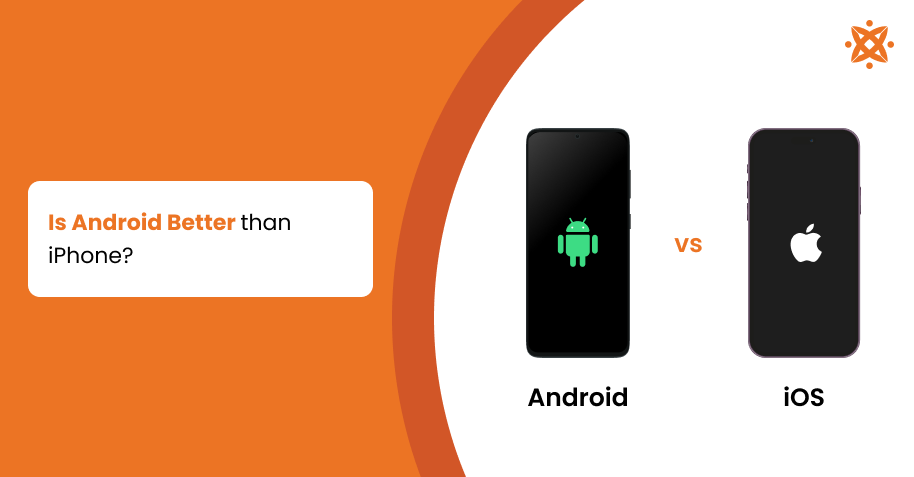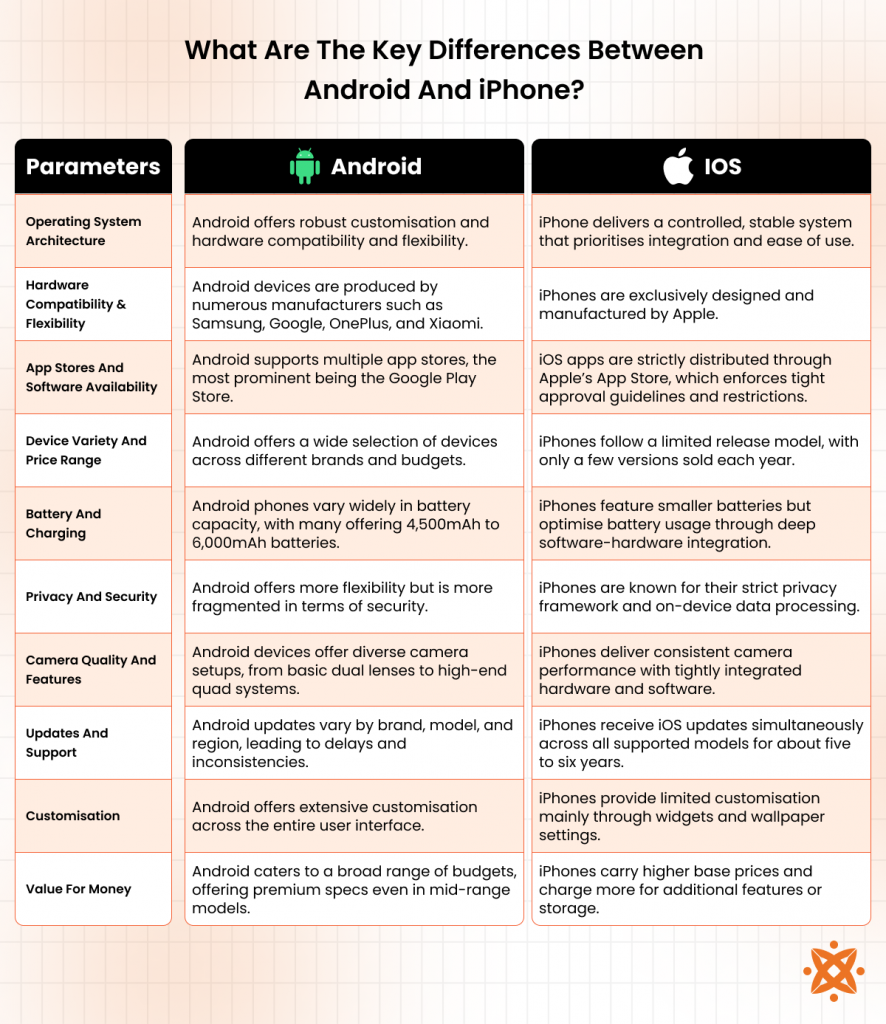
Yes, Android is better than iPhone because it offers more hardware variety, deeper customisation, broader price ranges, and faster charging options. While iPhones excel in stability, updates, and privacy, Android stands out with greater freedom, innovation, and flexibility. Users have access to models like the Samsung Galaxy S24 Ultra, Google Pixel 8 Pro, and OnePlus 12, offering powerful alternatives to the iPhone 15 and iPhone SE.
According to Tekrevol's (2025) Android held 70.8-72 % of the global mobile OS market with 3.9-4.5 billion users, compared to iOS's 28-29.2 % share with 1.46-1.8 billion users.
What Are The Key Differences Between Android And iPhone?
The key differences between Android and iPhone are highlighted below:

1. Operating System Architecture
Android is built on a Linux-based kernel, which forms the foundation of its open-source architecture. It now uses the Android Runtime (ART), replacing the older Dalvik VM, which compiles apps into native code ahead of time for improved performance.
Its kernel supports a wide range of hardware architectures, from ARM to x86, and allows third-party OS forks and deep customisation thanks to open-source licensing. This flexibility underpins Android's strength in hardware flexibility and contributes to its expansive device variety and price range.
Ultimately, the contrast in operating system architecture highlights a core aspect of the Android vs. iPhone debate: Android offers robust customisation and hardware compatibility and flexibility, while iPhone delivers a controlled, stable system that prioritises integration and ease of use. Your preference depends on whether you prioritise deep customisation or a curated, unified experience.
2. Hardware Compatibility And Flexibility
Android devices are produced by numerous manufacturers such as Samsung, Google, OnePlus, and Xiaomi. This leads to a broad spectrum of hardware choices that span entry-level to premium flagship models. The Android hardware flexibility allows brands to experiment with foldable screens, gaming-centric builds, larger batteries, headphone jacks, and expandable storage.
On the other hand, iPhones are exclusively designed and manufactured by Apple. This tight control ensures optimised integration between iOS and hardware, but it restricts flexibility in terms of form factor, features, and custom hardware preferences. Apple sticks to uniform design choices across its line-up, limiting external storage, headphone ports, and customisation options.
3. App Stores And Software Availability
Android supports multiple app stores, the most prominent being the Google Play Store. Users also install apps from third-party sources like APKMirror and Aptoide, expanding access to niche or region-specific apps. This open model encourages broader developer participation, especially for global and independent creators. The flexibility benefits users looking for diverse content and non-restricted app ecosystems.
In contrast, iOS apps are strictly distributed through Apple's App Store, which enforces tight approval guidelines and restrictions. While this boosts quality control, it limits user freedom to install apps outside the ecosystem. Many popular Android apps arrive earlier or with more features due to fewer platform limitations. The closed system limits custom tools or modified apps that are common in the Android app environment but are restricted for iOS app users.
4. Device Variety And Price Range
Android offers a wide selection of devices across different brands and budgets. From low-cost options under £150 to premium flagships over £1,000, there's a phone for nearly every price point. Manufacturers like Samsung, Xiaomi, and OnePlus provide choices in features, performance, and build quality. This range makes Android more accessible to first-time or budget-conscious buyers.
In contrast, iPhones follow a limited release model, with only a few versions sold each year. Apple's pricing begins at mid-range and extends to ultra-premium tiers, excluding the budget segment. While older iPhones are still sold at lower prices, they don't match Android's sheer variety. For users comparing value for money smartphones, Android holds a clearer edge.
5. Battery And Charging
Android phones vary widely in battery capacity, with many offering 4,500mAh to 6,000mAh batteries. Fast charging speeds range from 25W to over 100W, with some devices charging fully in under 30 minutes. Wireless and reverse wireless charging are widely supported across brands. These features give Android an edge in power management and speed flexibility.
iPhones feature smaller batteries but optimise battery usage through deep software-hardware integration. Charging speeds remain slower, with most models capped around 20W for wired charging. Wireless charging is supported, but reverse charging hasn't been introduced yet. For users comparing longevity and charging speed, Android leads on raw power and efficiency.
6. Privacy And Security
iPhones are known for their strict privacy framework and on-device data processing. Apple limits tracking, restricts app access to sensitive data, and offers clear permissions controls. Features like App Tracking Transparency enhance user control over personal information. This makes iOS a strong contender in the privacy Android vs iPhone discussion.
Android offers more flexibility but is more fragmented in terms of security. Google rolls out monthly security patches, but not all devices receive them promptly. Android 13+ improves permissions and background activity control, but data-sharing policies differ by brand. For tighter privacy and timely protection, iPhone generally maintains an advantage.
7. Camera Quality And Features
Android devices offer diverse camera setups, from basic dual lenses to high-end quad systems. Brands like Google and Samsung focus on computational photography and advanced zoom capabilities. Features such as periscope lenses and AI-enhanced night modes are more common. This gives Android users broader options in camera quality comparison.
iPhones deliver consistent camera performance with tightly integrated hardware and software. Apple's image processing ensures natural colour, detail, and stability across its models. Features like Photonic Engine and Cinematic Mode enhance photo and video quality. While Android offers variety, iPhone stands out for reliable, uniform results.
8. Updates And Support
iPhones receive iOS updates simultaneously across all supported models for about five to six years. This ensures long-term support and access to the latest features, bug fixes, and security patches. The uniform rollout helps all users stay up-to-date immediately. Apple's approach adds strong appeal for those seeking consistency.
Android updates vary by brand, model, and region, leading to delays and inconsistencies. While Google's Pixel line offers up to seven years of updates, many other brands stop at three to four. Security patches also depend on the manufacturer's policy and the carrier's involvement. In terms of long-term reliability, iPhone has a stronger track record.
9. Customisation
Android offers extensive customisation across the entire user interface. You change launchers, icons, widgets, and even system-level functions without rooting. Features like split-screen multitasking and gesture controls are also customisable. This appeals strongly to users who want full control over their device's appearance and behaviour.
iPhones provide limited customisation mainly through widgets and wallpaper settings. iOS restricts layout changes, and app icons follow a strict grid system. While iOS 16+ allows some widget and lock screen edits, system-level tweaks aren't permitted. Compared to Android customisation, iPhone remains far more rigid and controlled.
10. Value For Money
Android caters to a broad range of budgets, offering premium specs even in mid-range models. Users find high-refresh displays, powerful processors, and fast charging below £400. This makes Android phones a strong choice for those seeking high value for money smartphones. The variety ensures better hardware at competitive prices.
iPhones carry higher base prices and charge more for additional features or storage. While they hold resale value well and provide long software support, the initial cost is steep. Features available in budget Androids are often reserved for premium iPhones. For pure cost-to-feature value, Android takes the upper hand.
Are Android Phones Better For Gaming?
Yes, Android phones are better for gaming. Many Android models are built with gaming in mind, offering high refresh rate displays, advanced cooling systems, and custom gaming modes. Brands like ASUS ROG, Nubia RedMagic, and Lenovo Legion specialise in gaming phones with up to 144Hz screens and shoulder triggers. These devices handle intensive titles smoothly and prioritise performance.
While iPhones use powerful chips like the A17 Pro, they lack gaming-specific hardware features and customisation tools found in many Android phones. Android's broader selection and hardware versatility make it a preferred platform for mobile gamers.
What Is The Best Android Phone That Beats iPhone?
The best Android phone that beats the iPhone in 2025 is the Samsung Galaxy S24 Ultra. It combines a powerful Snapdragon 8 Gen 3 processor with a 200MP main camera, a 6.8-inch QHD+ AMOLED display, and S Pen support, features Apple doesn't match in a single device.
The phone also supports 45W fast charging, up to 1TB storage, and runs One UI 6 with extended software updates. For users who value camera flexibility, display quality, and Android customisation, the Galaxy S24 Ultra outperforms the iPhone 15 Pro Max in both versatility and hardware power.
Is Samsung Better Than Apple?
Yes, Samsung is better than Apple in several key areas. Samsung offers greater hardware diversity, including foldables, stylus support, and faster charging. Its Galaxy S series competes directly with iPhones, but with more flexible features like expandable storage (in past models), higher display resolutions, and broader device options. The One UI interface also allows deeper customisation than iOS.
While Apple excels in ecosystem integration, update uniformity, and resale value, Samsung leads in Android hardware flexibility, innovation, and device variety. For users who prioritise features, display quality, and value for money smartphones, Samsung provides more competitive and diverse choices.
Never Miss an Update From Us!
Sign up now and get notified when we publish a new article!
Dhaval Sarvaiya
Co-Founder
Hey there. I am Dhaval Sarvaiya, one of the Founders of Intelivita. Intelivita is a mobile app development company that helps companies achieve the goal of Digital Transformation. I help Enterprises and Startups overcome their Digital Transformation and mobile app development challenges with the might of on-demand solutions powered by cutting-edge technology.
